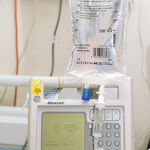3. What is the ethical method of action to continue caring for this patient without jeopardizing her safety, if you cannot obtain records for review at the facility where she receives the rituximab infusion you ordered?
The desired outcome is to provide care for your patient and optimize their disease control, best with a treat-to-target approach.2 The ethical issue remains that communication is paramount to be able to provide adequate care in any medical situation. The rheumatologist treating this patient is ultimately responsible for the monitoring of side effects of the medications prescribed, including laboratory monitoring, but the data need to be available for the proper monitoring to occur. Results of laboratory testing and infusions notes are necessary for this monitoring to occur. Each state has laws pertaining prompt release of medical records. For example, the requirement in Texas is that the release of medical records should be within 14 business days.3 If that is not satisfied or corrected, the provider in violation of this statute can be reported to the Texas Medical Board and disciplined accordingly. The rules and regulations that apply may vary from state to state, and it is important that we are all familiar with these statutes. If communications remains poor after attempts to correct these issues, then a change in infusion center would be most appropriate.
4. Who is responsible for the safety lab review, the rheumatologist as the ordering physician or the oncologist as the infusion clinic supervisor?
Ultimately, the ordering physician would be held responsible for the results and the follow up required by the results. However, depending on how the orders were written for the labs to be done, is it is possible that the ordering physician (rheumatologist) is not the actual physician on the orders because of the labs being drawn at the infusion center. In that case, the hematologist is not only responsible for following up on the results, he is also responsible to delegate on reporting the abnormal values to the rheumatologist.
Back to the Case
After the case was presented in a meeting at the Ethics Committee of the ACR, the rheumatologist decided to attempt to resolve the situation. After a cordial dialogue, the hematologist agreed to continue rituximab infusion therapy at his facility, under the rheumatologist’s orders, as stipulated by the rheumatoid arthritis protocol. The laboratory results and notes from the infusion center were eventually provided to the rheumatologist. The patient has done extremely well on therapy and continues to have an excellent relationship with both providers. The salient point of this discussion is that communication between providers and appropriate coordination of care can be the decisive issue in the outcome of your patient.


